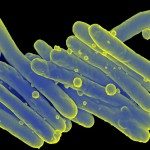Link to Pubmed [PMID] – 27121350
Mol. Microbiol. , 101, (3 ) 2016
Interactive link to publication: Mol. Microbiol. 101: 515-529 (2016)
Abstract:
The natural resistance of Mycobacterium abscessus to most commonly available antibiotics seriously limits chemotherapeutic treatment options, which is particularly challenging for cystic fibrosis patients infected with this rapid-growing mycobacterium. New drugs with novel molecular targets are urgently needed against this emerging pathogen. However, the discovery of such new chemotypes has not been appropriately performed. Here, we demonstrate the utility of a phenotypic screen for bactericidal compounds against M. abscessus using a library of compounds previously validated for activity against M. tuberculosis. We identified a new piperidinol-based molecule, PIPD1, exhibiting potent activity against clinical M. abscessus strains in vitro and in infected macrophages. Treatment of infected zebrafish with PIPD1 correlated with increased embryo survival and decreased bacterial burden. Whole genome analysis of M. abscessus strains resistant to PIPD1 identified several mutations in MAB_4508, encoding a protein homologous to MmpL3. Biochemical analyses demonstrated that while de novo mycolic acid synthesis was unaffected, PIPD1 strongly inhibited the transport of trehalose monomycolate, thereby abrogating mycolylation of arabinogalactan. Mapping the mutations conferring resistance to PIPD1 on a MAB_4508 tridimensional homology model defined a potential PIPD1-binding pocket. Our data emphasize a yet unexploited chemical structure class against M. abscessus infections with promising translational development possibilities.



